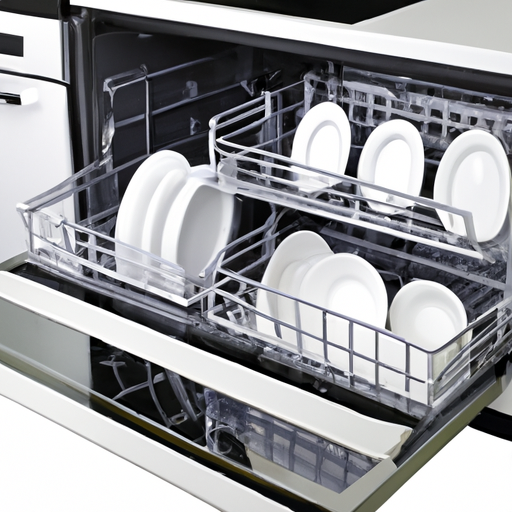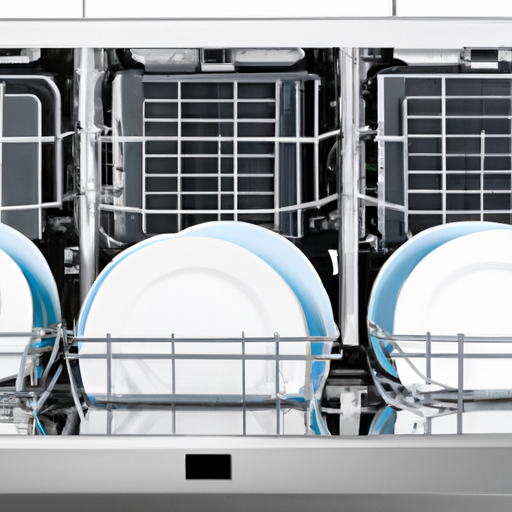How Do Smart Dishwashers Differ From Traditional Ones
In the world of ever-advancing technology, even our kitchen appliances are getting smarter. But what exactly sets a smart dishwasher apart from its traditional counterpart? Smart dishwashers come equipped with a host of innovative features, such as Wi-Fi connectivity, voice control, and advanced sensors, that make the task of dishwashing more convenient and efficient than ever before. By streamlining the process, reducing energy consumption, and providing customizable options, smart dishwashers are revolutionizing the way we approach the age-old chore.
Understanding Traditional Dishwashers
Brief history of traditional dishwashers
Traditional dishwashers have been a staple in kitchens for decades, providing a convenient way to clean and sanitize our dishes. The first electric dishwasher was invented in the early 20th century and revolutionized the way we handle our kitchen chores. This early version consisted of a simple tub with rotating arms that sprayed hot water and soap onto the dishes.
The working principles of traditional dishwashers
Traditional dishwashers operate on a simple yet effective principle. Once the dishes are loaded into the dishwasher, water mixed with detergent is heated and sprayed onto the dishes. The rotating spray arms ensure that all surfaces of the dishes are cleaned thoroughly. After the cleaning cycle, the used water is drained and the dishes are rinsed with fresh water to remove any remaining soap residue.
Common features and settings
Traditional dishwashers come equipped with a range of features and settings to cater to different user preferences. These features include adjustable racks, various wash cycles such as heavy-duty, normal, and delicate, as well as options for heat drying or air drying. Many traditional dishwashers also have built-in sensors to detect the level of dirtiness and adjust the wash cycle accordingly. These features contribute to the versatility and effectiveness of traditional dishwashers.
Introduction to Smart Dishwashers
What are smart dishwashers
Smart dishwashers are the next level of innovation in kitchen appliances. They are connected to the internet and can be controlled and monitored remotely through smartphones or other smart devices. With the ability to integrate with other smart home devices and systems, smart dishwashers offer convenience and automation like never before.
Brief history of smart dishwashers
Smart dishwashers are relatively new to the market but have quickly gained popularity among tech-savvy consumers. The introduction of smart technology in dishwashers has allowed manufacturers to develop appliances that are more efficient, user-friendly, and adaptable to individual needs. The first smart dishwasher was released in the early 2010s, combining traditional dishwasher functionality with internet connectivity and smart features.
Key features of smart dishwashers
Smart dishwashers boast an array of advanced features. These include voice control capabilities, allowing users to operate the dishwasher using voice commands through devices like Amazon Alexa or Google Assistant. They also offer personalized settings and recommendations based on individual usage patterns, ensuring efficient and customized cleaning results. Additionally, smart dishwashers can be integrated into smart home systems, enabling seamless automation and syncing with other connected devices.

This image is property of images.unsplash.com.
Differences in Functionality
Basic functions of traditional dishwashers
Traditional dishwashers focus primarily on washing dishes efficiently and effectively. They offer various wash cycles and temperature settings to cater to different types of dishes and levels of dirtiness. Basic functionalities include the ability to clean dishes thoroughly, remove tough stains, and sanitize dishes using high-temperature rinses.
Advanced features incorporated in smart dishwashers
Smart dishwashers take functionality to the next level by incorporating advanced features. These include sensors that detect the amount of food particles on dishes and adjust the wash cycle accordingly, as well as the ability to connect to home wireless networks for remote control and monitoring. Smart dishwashers also often offer additional washing options such as eco-friendly cycles to save water and energy.
Comparing cleaning efficiency between traditional and smart dishwashers
When it comes to cleaning efficiency, both traditional and smart dishwashers excel in their own ways. Traditional dishwashers use their rotating spray arms and high-temperature water to ensure thorough cleaning. Smart dishwashers, on the other hand, utilize sensors and advanced algorithms to optimize cleaning based on the level of dirtiness and specific dish types. While both types of dishwashers deliver excellent cleaning results, smart dishwashers offer an added level of customization and adaptability.
Energy Efficiency
Energy use in traditional dishwashers
Traditional dishwashers, while effective at cleaning dishes, can be energy-intensive. They typically use a substantial amount of water and require heated water for optimal cleaning results. This leads to increased energy consumption and higher utility bills. However, advancements in technology have allowed manufacturers to develop more energy-efficient models by incorporating features such as temperature sensors, better insulation, and improved water efficiency.
Energy-saving features of smart dishwashers
Smart dishwashers are designed with energy efficiency in mind. They often come equipped with energy-saving modes that reduce water consumption, shorten the duration of the wash cycle, and utilize lower water temperatures. Additionally, the integration of smart technology allows users to monitor energy usage and set personalized energy-saving preferences, further reducing the overall environmental impact.
Comparative analysis on energy efficiency
When comparing the energy efficiency of traditional and smart dishwashers, it’s evident that smart dishwashers have an edge. The ability to optimize energy usage through personalized settings and the incorporation of energy-saving features results in significant energy savings over time. While traditional dishwashers have made strides in energy efficiency, the advanced technology utilized in smart dishwashers gives them a clear advantage in this aspect.

This image is property of images.unsplash.com.
Connectivity and Controls
Control interfaces on traditional dishwashers
Traditional dishwashers typically feature manual control interfaces such as buttons or dials. These interfaces allow users to select the desired wash cycle, adjust temperature settings, and activate additional features such as drying options. While straightforward to use, these interfaces offer limited customization and lack the convenience of remote control.
Integration of IoT in smart dishwashers
Smart dishwashers leverage the power of the Internet of Things (IoT) to offer seamless connectivity and control. They can be connected to home wireless networks, allowing users to operate them remotely through smartphone apps or voice assistants. This integration of IoT enables users to monitor the progress of a wash cycle, receive notifications when the cycle is complete, and even schedule wash cycles ahead of time.
Remote control and monitoring features in smart dishwashers
Smart dishwashers provide the ultimate convenience when it comes to control and monitoring. Utilizing smartphone apps, users can remotely start, pause, or stop a wash cycle, adjust settings, and receive alerts and notifications. This level of control ensures that the dishwasher can be managed even when you are away from home, making your daily routine more efficient and effortless.
Maintenance and Longevity
Maintenance needs of traditional dishwashers
Traditional dishwashers, like any other household appliance, require regular maintenance to ensure optimal performance and longevity. This includes cleaning the interior of the dishwasher, replacing filters, and checking for any signs of wear and tear. Additionally, traditional dishwashers may require periodic servicing by professionals to address any mechanical or electrical issues.
Self-maintenance and diagnosis in smart dishwashers
Smart dishwashers are designed to simplify maintenance and provide self-diagnostic capabilities. They can detect and notify you of any potential issues or malfunctions, allowing for timely intervention or professional assistance. Smart dishwashers often come with self-cleaning cycles and filter cleaning reminders, helping to maintain the cleanliness of the dishwasher and prevent clogs.
Comparing lifespan of smart and traditional dishwashers
Both smart and traditional dishwashers have a similar lifespan, usually ranging from 7 to 12 years depending on usage and maintenance. While traditional dishwashers require regular upkeep and may experience wear and tear over time, smart dishwashers’ self-maintenance features and diagnostic capabilities can help prolong their lifespan. By addressing potential issues promptly and maintaining optimal performance, smart dishwashers offer an advantage in terms of longevity.

This image is property of images.unsplash.com.
Ease of Use
User-friendliness of traditional dishwashers
Traditional dishwashers have a straightforward user interface, making them easy to use. The control buttons or dials are typically labeled clearly, allowing users to select the desired wash cycle and adjust settings with ease. However, the lack of customization options and remote control capabilities can limit the convenience and adaptability of traditional dishwashers.
Streamlined user interface of smart dishwashers
Smart dishwashers provide a streamlined user experience through their intuitive smartphone apps and voice control capabilities. The user interface on the app offers a range of options and settings, allowing for personalized and precise control of the dishwasher. Voice control further simplifies the user interface, offering a hands-free and effortless approach to operating the appliance.
Availability and functionality of mobile apps for smart dishwashers
Most smart dishwashers come with dedicated mobile apps that offer extensive functionality and control. These apps allow users to initiate and monitor wash cycles, adjust settings, receive notifications, and even provide maintenance reminders. With the ability to connect multiple smart home appliances, these apps offer a centralized control hub for managing various aspects of your kitchen and home.
Water Consumption and Efficiency
Water usage in traditional dishwashers
Traditional dishwashers typically consume a significant amount of water during a wash cycle. Depending on the model, they can consume anywhere from 4 to 10 gallons of water per cycle. This higher water consumption can have an impact on both the environment and water bills, especially in areas with water scarcity or high water costs.
Water-saving features of smart dishwashers
Smart dishwashers are designed to be more water-efficient, offering features that help minimize water consumption without compromising on the cleaning performance. Many smart dishwashers utilize sensors to detect the level of dirtiness on dishes and adjust the wash cycle accordingly. They also offer specific eco-friendly cycles that use less water and energy, optimizing both cleaning results and resource efficiency.
Comparison of water efficiency
When comparing water efficiency between traditional and smart dishwashers, the latter clearly takes the lead. Smart dishwashers’ ability to adapt water usage based on individual dish cleanliness, coupled with dedicated eco-friendly cycles, significantly reduces water consumption. This not only reduces the environmental impact but also contributes to cost savings in water bills.

Price and Value for Money
Price range of traditional dishwashers
Traditional dishwashers come in a wide range of prices, depending on the brand, model, and features. On average, traditional dishwashers can cost anywhere from $300 to $1500. The price variation reflects the different levels of functionality and performance offered by different models.
Cost of smart dishwashers
Smart dishwashers generally fall at the higher end of the price spectrum due to their advanced features and connectivity capabilities. On average, smart dishwashers can range from 0 to 00. The higher price point is justified by the added functionality, convenience, and energy-saving features that smart dishwashers bring to the table.
Comparing cost-effectiveness and value for money
While the upfront cost of smart dishwashers may be higher than traditional dishwashers, their long-term cost-effectiveness and value for money is worth considering. The energy-saving features and personalized settings of smart dishwashers lead to reduced utility bills over time. Additionally, the convenience, remote control capabilities, and integration with smart home systems provide added value in terms of time-saving and overall efficiency.
Examples and Reviews of Smart Dishwashers
Popular brands and models of smart dishwashers
There are several reputable brands that offer smart dishwashers, each with their own unique features and functionality. Some popular brands include Bosch, Samsung, LG, and KitchenAid. Models like the Bosch 800 Series, Samsung DW80R9950US, LG LDT5678ST, and KitchenAid KDTM604KPS have received positive reviews for their performance, connectivity options, and overall user experience.
User reviews and their experiences
Users who have embraced smart dishwashers have praised their convenience and the ability to integrate them into their smart homes. Many have appreciated the remote control features and the ease of monitoring wash cycles from their smartphones. Users have also noted how the personalized settings and energy-saving features have positively impacted their utility bills, making smart dishwashers a worthwhile investment.
Evaluating the rise in popularity of smart dishwashers
The rise in popularity of smart dishwashers can be attributed to the advancements in technology and our increasing reliance on smart devices. As more consumers embrace the Internet of Things and seek ways to simplify their daily routines, the convenience and added functionality of smart dishwashers become increasingly appealing. With positive user experiences, word-of-mouth recommendations, and the increasing availability of smart home appliances, the popularity of smart dishwashers is expected to continue to rise.
In conclusion, smart dishwashers offer a range of advanced features and capabilities that set them apart from traditional dishwashers. From enhanced connectivity and control options to improved energy and water efficiency, these appliances provide a convenient and efficient solution for cleaning our dishes. While the upfront cost of smart dishwashers may be higher, their long-term cost-effectiveness, customization options, and ability to seamlessly integrate into smart homes make them a compelling choice for those seeking a modern and efficient kitchen appliance.





